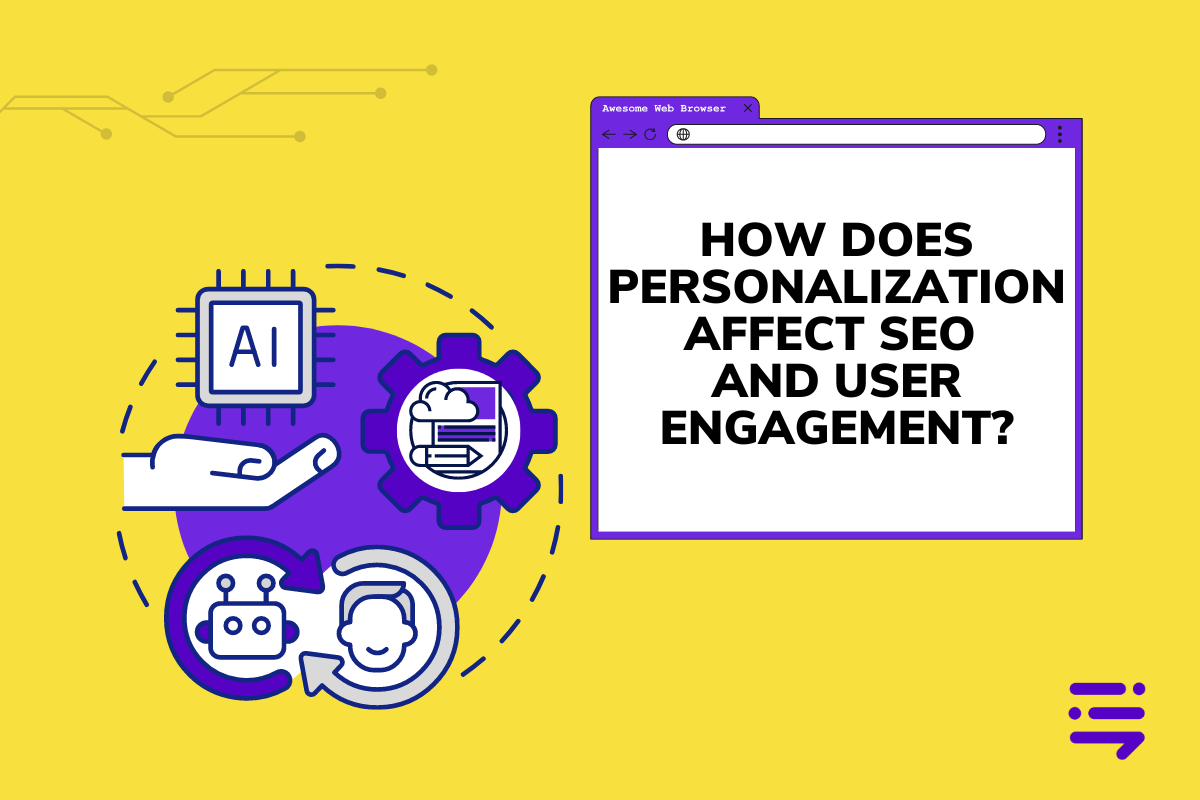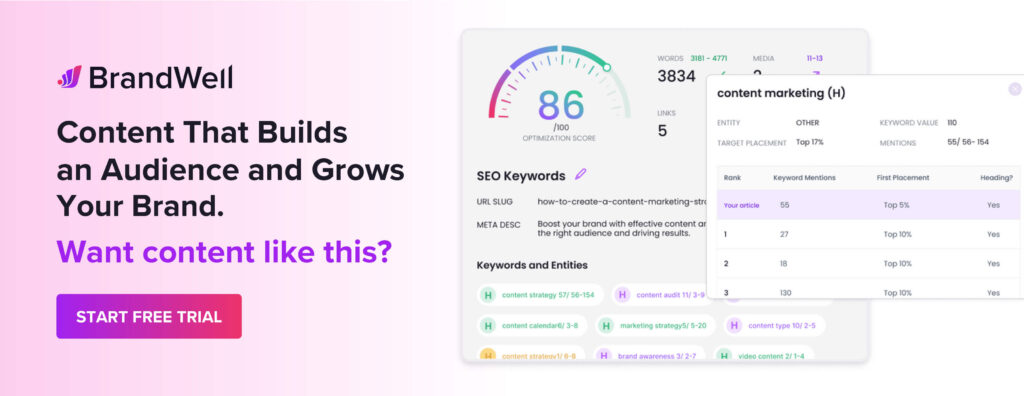Discover top guides, trends, tips and expertise from AIO Writers
How Does Personalization Affect SEO and User Engagement?
Julia McCoy
Monday, 13th May 2024
You’ve heard the buzz about personalization in marketing. It’s the holy grail to building trust and credibility, right? Tailored experiences that make your audience feel like you’re reading their minds.
But hold up, what about SEO? Will all this customization tank your search engine rankings and traffic?
It’s a legitimate worry, I get it. You don’t want to invest countless hours creating an incredible personalized experience, just to watch your organic search presence crumble.
So, let’s clear the air and dive into the nitty-gritty of how personalization affects SEO.
Table Of Contents:
- What Is Website Personalization and How Does It Work?
- Benefits of Website Personalization
- Challenges of Implementing Website Personalization
- How Does Personalization Affect SEO?
- How Does Personalization Affect User Engagement?
- Best Practices for Website Personalization Without Hurting SEO
- The Future of Personalization and SEO
- FAQs: How Does Personalization Affect SEO
- Conclusion
What Is Website Personalization and How Does It Work?
You’ve probably noticed how websites seem to magically know what you’re interested in. Suddenly, the ads are eerily relevant and the content feels tailor-made just for you.
That, my friend, is the power of personalization.
But how exactly does it function behind the scenes?
Types of Website Personalization
Websites personalize your visit by:
- Displaying dynamic content based on your demographics, location, or past behavior on the site
- Recommending products or articles similar to what you’ve viewed before
- Changing the layout, imagery, or offers shown based on what’s worked well for similar users
User data is the secret ingredient for a personalized website. It allows us to understand each user’s tastes and serve them content that satisfies their unique needs.

Benefits of Website Personalization
When done right, personalization can be a game-changer. By delivering content and experiences that resonate with each user, you can:
- Boost engagement and time spent on your site
- Increase conversions and revenue
- Build brand loyalty and affinity
Improved User Engagement
User engagement is crucial for any website aiming to achieve high search engine rankings. Personalized content directly addresses the interests or needs of your audience, making them more likely to spend time interacting with your site.
This increased engagement signals to search engines like Google that your site provides valuable content, potentially improving your SEO rankings.
For instance, by showcasing products similar to what visitors have previously viewed or purchased — much like what Amazon does — you create a more engaging shopping experience that encourages further exploration.
Increase in Conversion Rates
A well-implemented personalization strategy can lead directly to higher conversion rates. When visitors feel that a website understands their specific needs and offers relevant solutions or products, they are far more likely to convert into paying customers or subscribers.
Tailored calls-to-action (CTAs) based on user behavior analytics can be particularly effective here, guiding users toward the next logical step whether it’s making a purchase or signing up for newsletters.
Enhanced User Experience (UX)
The cornerstone of successful SEO today lies in providing an excellent user experience — and personalized websites excel at this. From customizing greetings based on the time of day to adjusting content recommendations according to past interactions on the site, every element creates a seamless browsing experience that keeps users coming back.
Incorporating these strategies within web design enhances overall satisfaction levels among visitors which indirectly influences SERP positions.
Challenges of Implementing Website Personalization
While personalization is a great goal to strive for, it’s not without its difficulties. A few typical hurdles include:
- Collecting quality data on users without violating their privacy
- Having the right tools and expertise to analyze that data and turn insights into action
- Ensuring a smooth, speedy experience despite the added complexity of dynamic content delivery
- Avoiding the “creepy” factor and providing transparency on how data is used
Navigating Privacy Concerns
The use of personal data for customization purposes raises significant privacy concerns. With increasing awareness about data protection among users, businesses need to be transparent about how they collect, use, and store personal information.
Adhering to General Data Protection Regulation (GDPR) guidelines in the EU or the California Consumer Privacy Act (CCPA) in the US is not just mandatory but also crucial for maintaining consumer trust. Implementing robust security measures to protect this data against breaches is equally important.

Data Security Measures
Besides compliance with regulatory standards like GDPR and CCPA, ensuring top-notch data security is paramount. This involves employing advanced encryption methods for storing sensitive user information and conducting regular security audits.
Businesses should also foster a culture of privacy by design within their organization to anticipate potential risks proactively.
Balancing Personalization With Inclusivity
In pursuit of personalized content delivery, there’s a risk of creating echo chambers where diverse perspectives are sidelined.
To combat this issue while improving your site’s SEO performance, businesses should strive for a balance between tailored content recommendations and exposure to varied viewpoints.
This ensures all visitors find relevant content without feeling isolated or overlooked due to algorithmic biases — a critical consideration as search engines increasingly value diversity and inclusiveness in ranking websites.
By addressing these challenges head-on, businesses can leverage personalization effectively while remaining respectful of individual privacy rights and promoting an inclusive digital environment.
How Does Personalization Affect SEO?
Now, you might be thinking – “Personalization sounds great for user experience, but what about my hard-earned search engine rankings? Will all this dynamic content throw Google for a loop?”
It’s a valid concern. After all, you don’t want your SEO efforts to go to waste. So let’s break down how personalization and SEO interact.
How Search Engines Handle Personalized Content
Search engines like Google use complex personalization algorithms that consider various factors to deliver tailored results. These algorithms take into account your search history, location, clicked results, mobile device, and other data points to show you the most relevant content.
So even without any on-site personalization, the search results a user sees may differ from the next person.
As for the personalized content on your site, Google has stated that as long as you’re showing the same content to users and search engine bots, it won’t negatively impact your search engine rankings.
Positive Effects of Personalization on SEO
Personalization can even give your SEO a boost in a few key ways:
- Improving engagement metrics like time on site which are positive user experience signals
- Increasing the odds of a user clicking your site in search results if it seems highly relevant to their query
- Encouraging repeat visits and building brand authority
All of these factors can indirectly help your search rankings over time.
Negative Effects of Personalization on SEO
However, there are a couple of potential pitfalls to watch out for:
- Creating duplicate content if you’re generating too many variations of a page
- Slowing down page load speed with poorly implemented dynamic elements
- Cloaking or showing different content to users vs search engines, which violates Google’s guidelines
How Does Personalization Affect User Engagement?
In the digital age, personalization has become a cornerstone of user engagement strategies. By tailoring content and experiences to individual preferences and behaviors, businesses can significantly enhance their interaction with users.
This personalized approach not only boosts user satisfaction but also plays a crucial role in improving SEO performance by increasing dwell time, reducing bounce rates, and encouraging more meaningful interactions on websites.
Personalized content is all about delivering the right message to the right person at the right time. It involves using data analytics and artificial intelligence to understand user preferences, browsing history, and other behavioral patterns.
Such insights enable marketers to craft content that resonates with each segment of their audience or even individual users. For instance, e-commerce sites often recommend products based on past purchases or viewed items – a tactic known for its effectiveness in boosting sales through enhanced relevance.
Tailored content improves overall user experience by making it feel unique and catered specifically to an individual’s needs.
When users find content relevant to them, they are likely to spend more time exploring your site which signals search engines about the quality of your website leading to potentially higher rankings.
Personalization also reduces bounce rate as visitors are greeted with what interests them instead of generic information.
Best Practices for Website Personalization Without Hurting SEO
So how can you reap the benefits of website personalization without sabotaging your SEO efforts?
Here are a few tips:
Use Canonical Tags
Personalization can result in multiple URLs with comparable content. To avoid duplicate content issues and consolidate ranking signals, use the canonical tag to indicate the primary version to search engines.
Maintain Site Speed and Performance
Use caching, asynchronous loading, and other performance optimization techniques to ensure your personalized site still loads quickly.
Site speed is a confirmed ranking factor, so don’t let slow load times negate the benefits of personalization.
Avoid Cloaking or Deceptive Practices
Always show search engine bots the same content you’re showing users. Anything else is considered cloaking and can result in penalties.
If you’re using personalization that relies heavily on cookies or login-required content, consider dynamic rendering as a workaround.
Focus on User Experience
At the end of the day, both personalization and SEO share the same goal: providing relevant, valuable content to users. By keeping the user at the center of your strategy, you’ll naturally create a site that both humans and search engines love.
Personalization can be a powerful tool for creating an incredible user experience that could also give your SEO a boost — as long as it’s done thoughtfully and strategically.
Crafting a personalized experience that resonates with your audience requires finesse – a delicate dance between SEO best practices and genuine, tailored content.
The Future of Personalization and SEO
The future is looking brighter than ever for personalization and SEO.
Why?
Two words: machine learning.
As these technologies continue to evolve at a breakneck pace, we’ll soon have the power to create experiences so tailored and so effective that our audiences won’t be able to resist.
But what exactly does the future hold? Let’s take a closer look.
Advancements in Machine Learning and AI
Machine learning and AI are already transforming the way we approach personalization and SEO. By analyzing vast amounts of user data and behavior patterns, these technologies can help us deliver highly targeted, relevant experiences to individual users.
Chatbots powered by AI offer tailored support and suggestions based on your previous chats and likes. At the same time, machine learning digs into your search history and web surfing to deliver content and product ideas picked just for you.
As these technologies continue to advance, we can expect even more granular and effective personalization strategies.
Imagine a world where every user receives a completely unique, tailored experience based on their individual needs and interests – that’s the power of machine learning and AI.
Balancing Personalization and Privacy Concerns
Of course, with great power comes great responsibility. As personalization becomes more sophisticated and targeted, privacy concerns are likely to come to the forefront.
People are waking up to the reality of how companies handle their personal data, and they want more say in the matter. To stay in their customers’ good graces, businesses need to be upfront about what data they collect and give people the choice to opt out of personalized experiences.
Finding the right balance between personalization and privacy will be key. Businesses that can deliver highly relevant, valuable experiences while respecting user privacy will be the ones that succeed in the long run.
Adapting to Evolving Search Algorithms
Finally, it’s important to remember that search algorithms are constantly evolving. What works today may not work tomorrow, and businesses need to be prepared to adapt their strategies accordingly.
Imagine a world where every time you search for something online, the top results are perfectly tailored to your needs. That’s the direction search engines are heading in as they become more advanced.
By prioritizing factors like user satisfaction, content value, and relevance, they’ll be able to deliver increasingly personalized search rankings that are just right for you.
To stay ahead of the curve, businesses need to focus on creating high-quality, valuable content that resonates with their target audience. They also need to leverage personalization strategies that enhance the user experience and keep visitors engaged.
By staying agile and adapting to the ever-changing search landscape, businesses can position themselves for long-term success in the world of personalization and SEO.
FAQs: How Does Personalization Affect SEO
How does personalization impact SEO?
Personalization tailors content to user behavior, potentially boosting engagement and lowering bounce rates. This can signal search engines that your site provides valuable content, possibly improving search engine rankings.
How much can personalization improve ranking?
While hard numbers vary, effectively implemented personalization strategies have shown positive impacts on search engine rankings by enhancing the user experience and engagement.
What is the impact of personalization?
The impact stretches beyond SEO; it shapes customer experiences. By leveraging user data for personalized content delivery, websites create more relevant and engaging experiences for individual users.
What are the effects of website personalization?
Website personalization affects both server-side performance and user satisfaction. It makes sites more dynamic but requires balancing with site speed to avoid negatively impacting search engine visibility.
Conclusion
Personalization and SEO don’t have to be mortal enemies. By understanding how search engines handle customized content and following best practices, you can strike a balance that delights your audience and keeps your organic traffic flowing.
The secret to successful personalization? Enhance the user experience without resorting to search results manipulation. Concentrate on offering authentic value and maintaining a speedy site. Shun deceptive practices at all costs.
Approach personalization correctly and it can become a mighty ally in your SEO campaign.

UNLOCK YOUR POTENTIAL
Long Headline that highlights Value Proposition of Lead Magnet
Grab a front row seat to our video masterclasses, interviews, case studies, tutorials, and guides.



